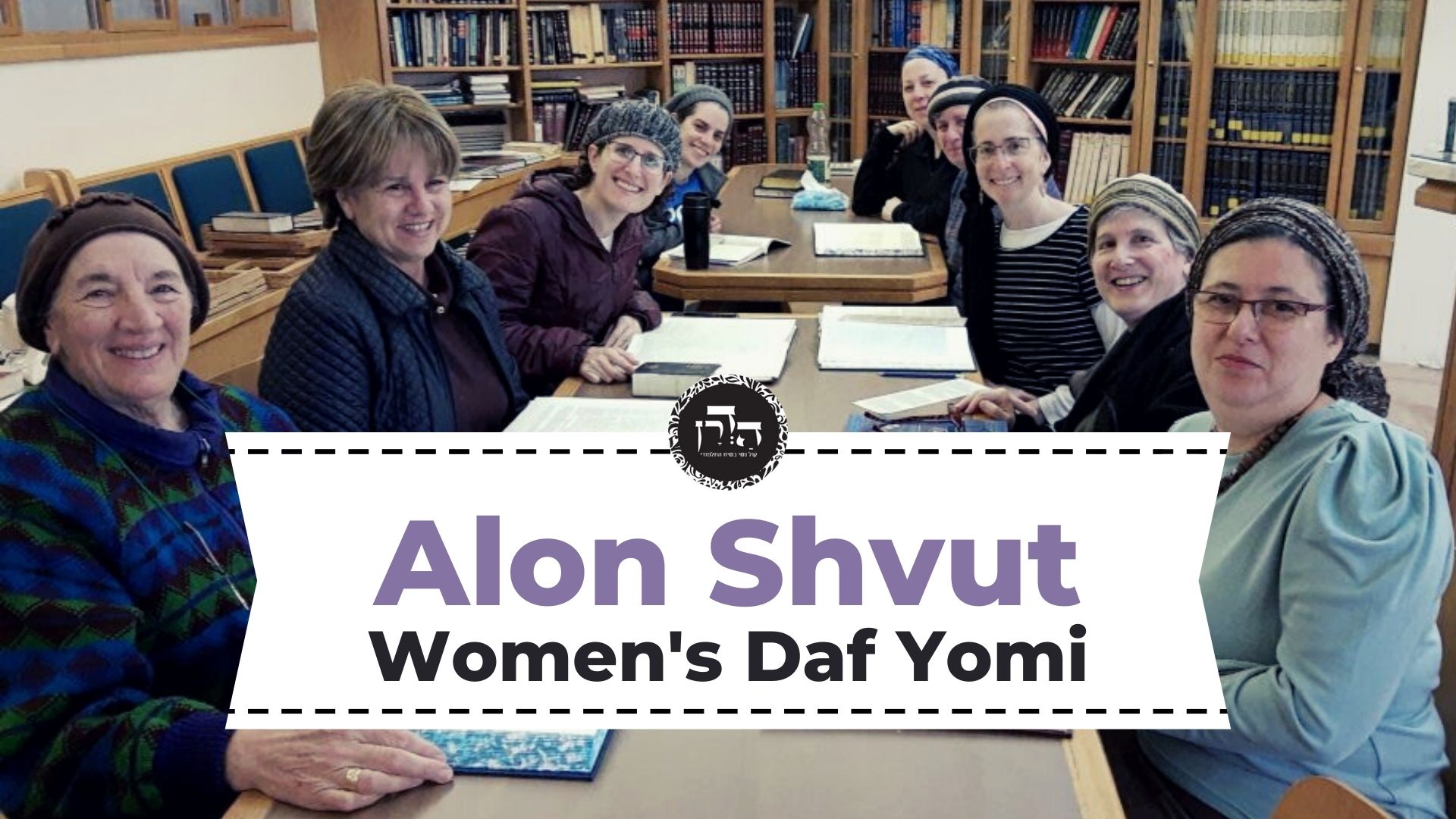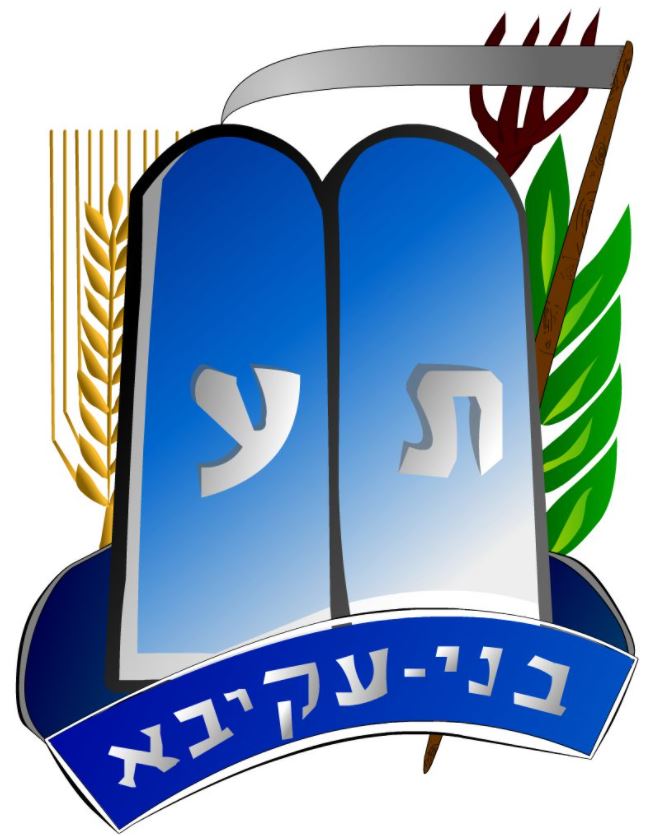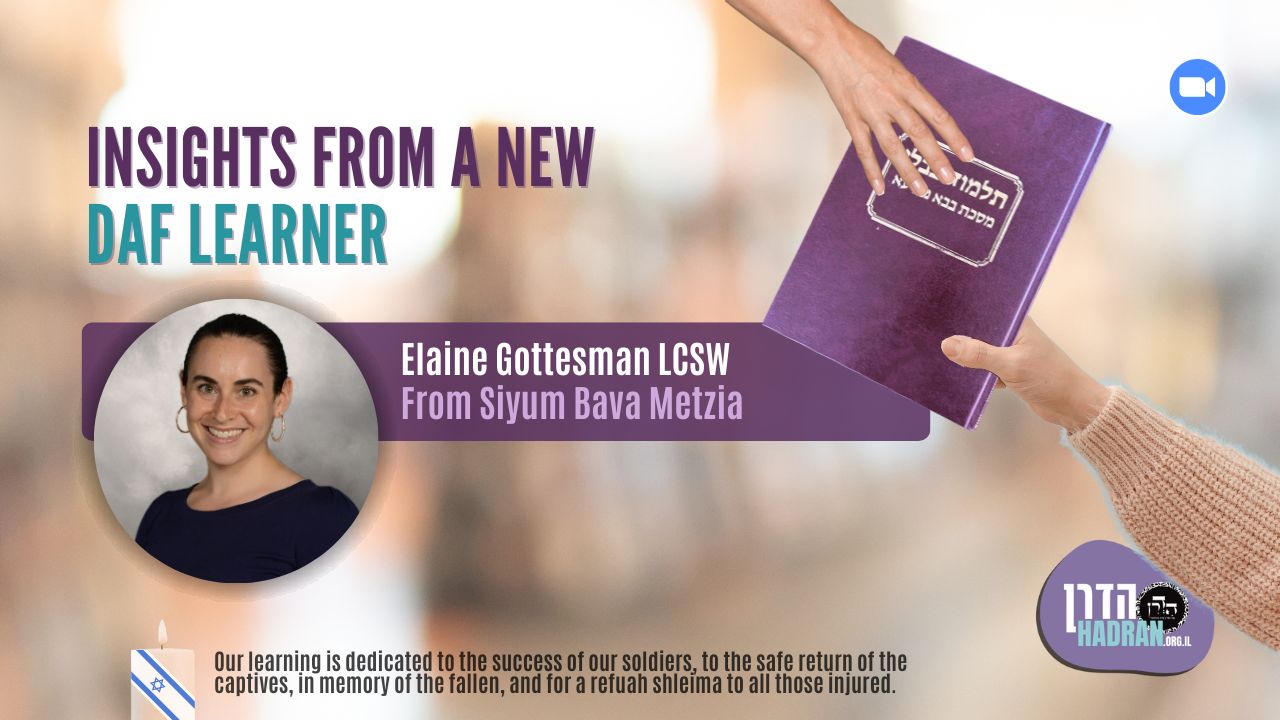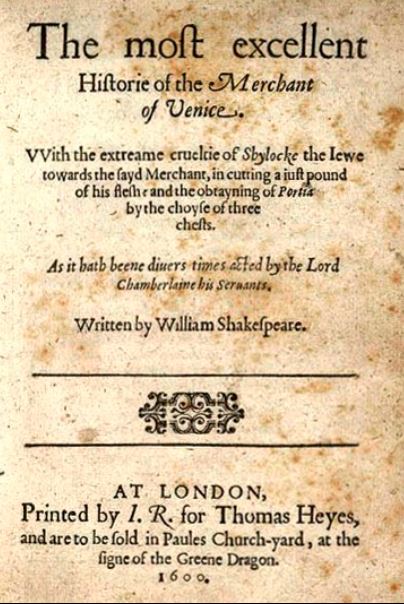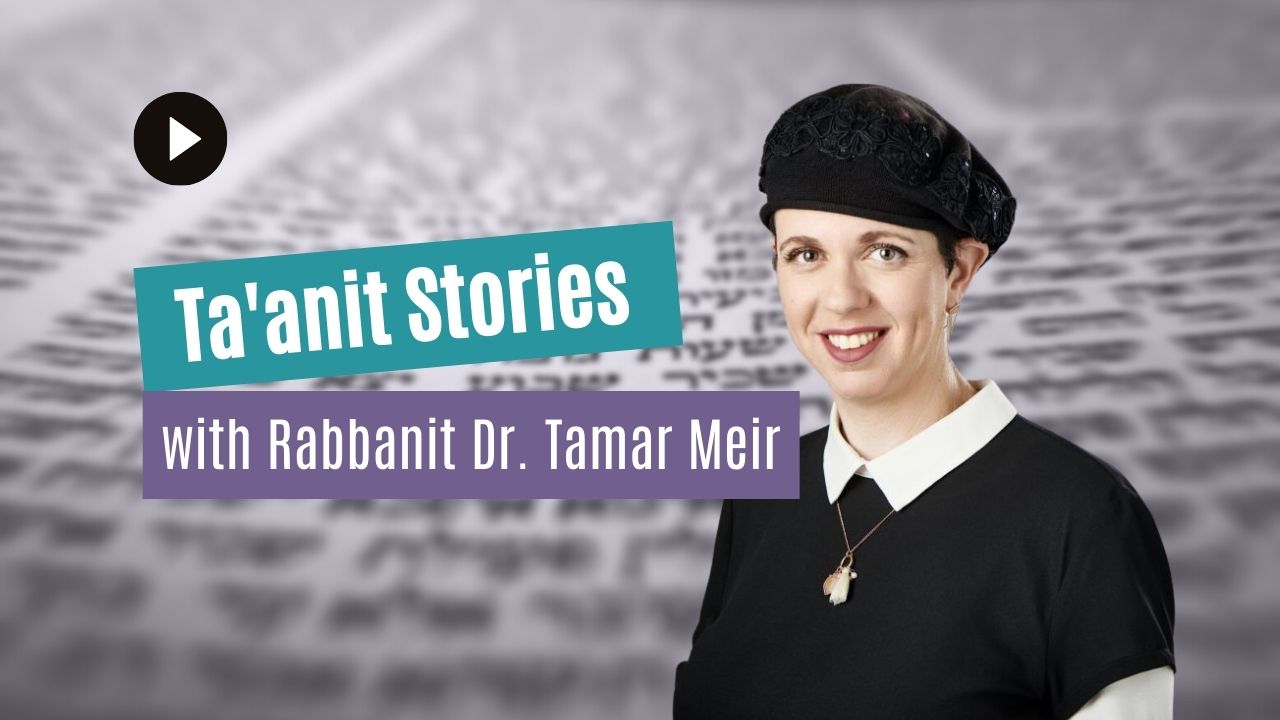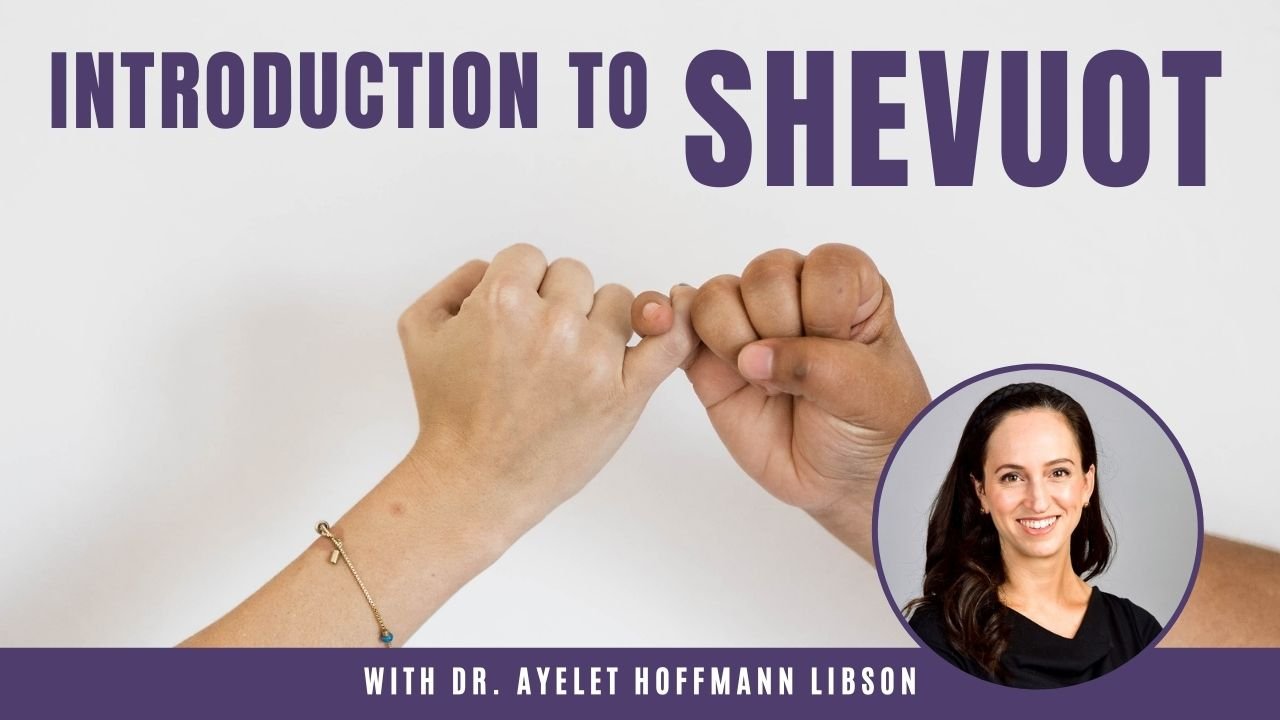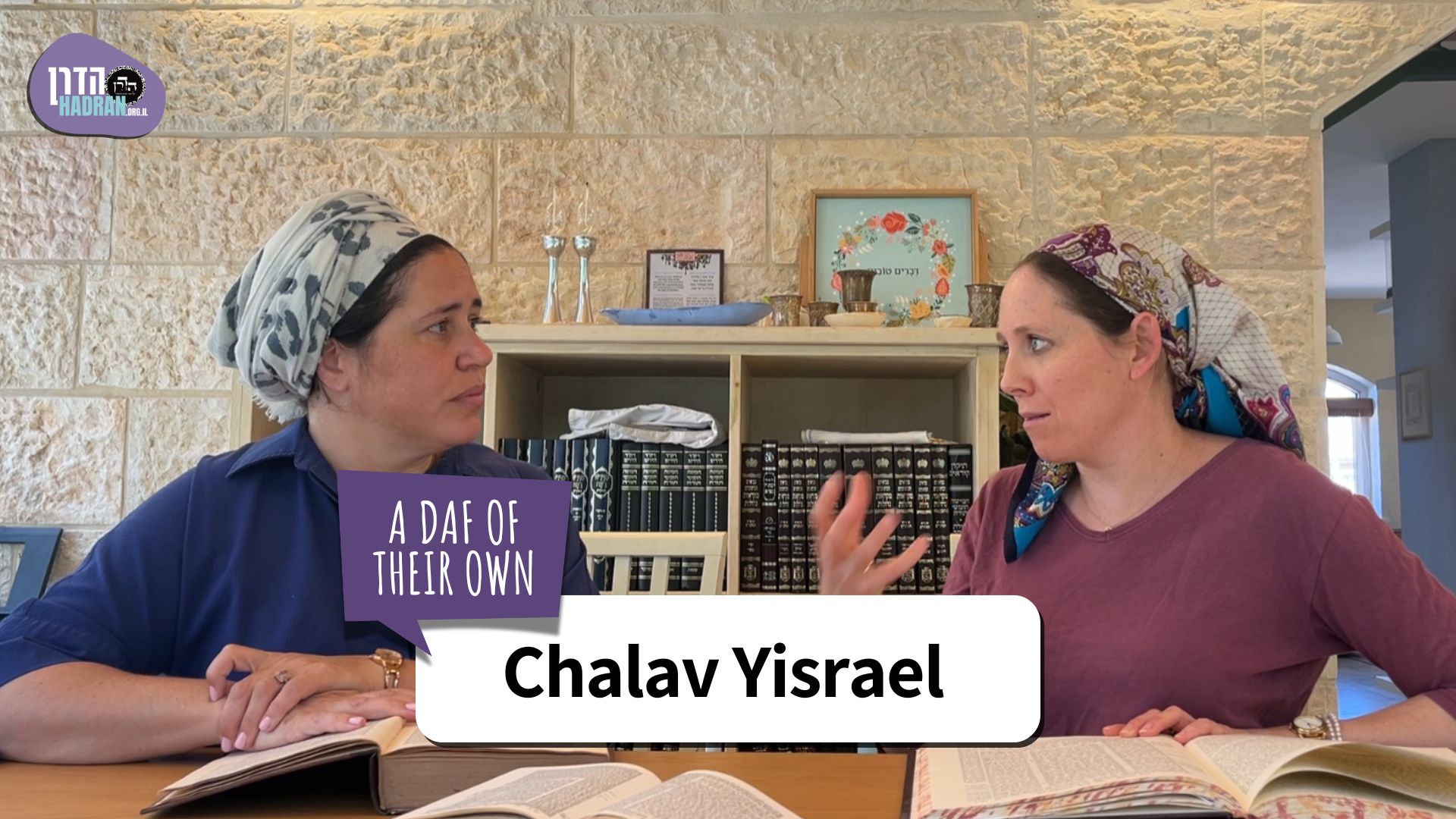One who says “my weight upon me”, what does one need to bring to the temple treasury? “The weight of my hand/arm” or “leg” – since there is no good way to measure it precisely, what does one do? Which part of the arm/leg? How does this compare to other places in the Torah where arm/leg is mentioned? “The value of my arm” – how does one evaluate the worth of an arm? It is the same as for laws of damages? How important is the the ceremony of the evaluation? Is it the same as for damages? If one was already evaluated for some other reason, does one also need a special evaluation for vows?
This week’s learning is sponsored for the merit and safety of Haymanut (Emuna) Kasau, who was 9 years old when she disappeared from her home in Tzfat two years ago, on the 16th of Adar, 5784 (February 25, 2024), and whose whereabouts remain unknown.
This week’s learning is dedicated of the safety of our nation, the soldiers and citizens of Israel, and for the liberation of the Iranian people. May we soon see the realization of “ליהודים היתה אורה ושמחה וששון ויקר”.
This week’s learning is sponsored for the merit and safety of Haymanut (Emuna) Kasau, who was 9 years old when she disappeared from her home in Tzfat two years ago, on the 16th of Adar, 5784 (February 25, 2024), and whose whereabouts remain unknown.
Want to dedicate learning? Get started here:


Today’s daily daf tools:
This week’s learning is sponsored for the merit and safety of Haymanut (Emuna) Kasau, who was 9 years old when she disappeared from her home in Tzfat two years ago, on the 16th of Adar, 5784 (February 25, 2024), and whose whereabouts remain unknown.
This week’s learning is dedicated of the safety of our nation, the soldiers and citizens of Israel, and for the liberation of the Iranian people. May we soon see the realization of “ליהודים היתה אורה ושמחה וששון ויקר”.
This week’s learning is sponsored for the merit and safety of Haymanut (Emuna) Kasau, who was 9 years old when she disappeared from her home in Tzfat two years ago, on the 16th of Adar, 5784 (February 25, 2024), and whose whereabouts remain unknown.
Today’s daily daf tools:
Delve Deeper
Broaden your understanding of the topics on this daf with classes and podcasts from top women Talmud scholars.
New to Talmud?
Check out our resources designed to help you navigate a page of Talmud – and study at the pace, level and style that fits you.
The Hadran Women’s Tapestry
Meet the diverse women learning Gemara at Hadran and hear their stories.
Arakhin 19
״שֶׁבְּזָכָר וְשֶׁבִּנְקֵבָה״ מִיבְּעֵי לֵיהּ.
Rather, the baraita should have stated: With regard to the male and with regard to the female, which are the terms the Torah uses with regard to valuations. The terms son and daughter are used in Yotze Dofen.
וּמַאי שְׁנָא נְקֵבָה, דְּכִי מִיזַּקְנָא קָיְימָא אַתִּילְּתָא, וּמַאי שְׁנָא זָכָר דְּלָא קָאֵי אַתִּילְּתָא? אָמַר חִזְקִיָּה: אָמְרִי אִינָשֵׁי: סָבָא בְּבֵיתָא — פָּאחָא בְּבֵיתָא, סָבְתָא בְּבֵיתָא — סִימָא בְּבֵיתָא.
With regard to valuations, the Gemara asks: And what is different with regard to a female, that when she ages past sixty years she stands at a valuation of ten shekels, one-third of her previous valuation of thirty shekels, and what is different with regard to a male, that when he ages past sixty, at which point he has a valuation of fifteen shekels, he does not stand at even one-third of his previous valuation of fifty shekels? Ḥizkiya said that people say a popular saying: If there is an elderly man in the home, there is a burden [paḥa] in the home, as he does not help with anything; if there is an elderly woman in the home, there is a treasure in the home,as she assists with various domestic labors.
הֲדַרַן עֲלָךְ הֶשֵּׂג יָד.
מַתְנִי׳ הָאוֹמֵר: ״מְשַׁקְּלִי עָלַי״ נוֹתֵן מִשְׁקָלוֹ, אִם כֶּסֶף כָּסֶף, וְאִם זָהָב זָהָב. מַעֲשֶׂה בְּאַמָּה שֶׁל יַרְמַטְיָא שֶׁאָמְרָה: ״מִשְׁקַל בִּתִּי עָלַי״, וְעָלְתָה לִירוּשָׁלַיִם וְשַׁקְלַהּ מִשְׁקָלָהּ זָהָב.
MISHNA: One who says: It is incumbent upon me to donate my weight, gives his weight to the Temple treasury; if he specified silver he donates silver, and if he specified gold he donates gold. There was an incident involving the mother of Yirmatya, who said: It is incumbent upon me to donate the weight of my daughter, and she ascended to Jerusalem and paid her daughter’s weight in gold to the Temple treasury.
״מִשְׁקַל יְדֵי עָלַי״, רַבִּי יְהוּדָה אוֹמֵר: מְמַלֵּא חָבִית מַיִם, וּמַכְנִיסָהּ עַד מַרְפֵּיקוֹ, וְשׁוֹקֵל מִבְּשַׂר חֲמוֹר וַעֲצָמוֹת וְגִידִים וְנוֹתֵן לְתוֹכָהּ עַד שֶׁתִּתְמַלֵּא. אָמַר רַבִּי יוֹסֵי: וְכִי הֵיאַךְ אֶפְשָׁר לְכַוֵּין בָּשָׂר כְּנֶגֶד בָּשָׂר וַעֲצָמוֹת כְּנֶגֶד עֲצָמוֹת? אֶלָּא שָׁמִין אֶת הַיָּד כַּמָּה הִיא רְאוּיָה לִשְׁקוֹל.
In the case of one who says: It is incumbent upon me to donate the weight of my forearm, how does he ascertain the weight of his forearm? Rabbi Yehuda says: He fills a barrel with water and inserts his arm up to his elbow into the water. And in order to measure the displacement, he weighs donkey flesh, and bones, and sinews and places it into the barrel until it fills, and the water level reaches the top of the barrel. He then donates the weight of the meat and the bones to the Temple treasury. Rabbi Yosei said: Displacement is according to volume not according to weight, and how then is it possible to match the amount of the donkey flesh with the flesh of a person and the volume of the donkey’s bones with his bones? Rather, the court appraises how much the forearm is likely to weigh.
גְּמָ׳ מַאי ״אִם כֶּסֶף כֶּסֶף אִם זָהָב זָהָב״? אָמַר רַב יְהוּדָה: פֵּירַשׁ כֶּסֶף — כֶּסֶף, פֵּירַשׁ זָהָב — זָהָב. פְּשִׁיטָא! הָא קָא מַשְׁמַע לַן: טַעְמָא דְּפֵירַשׁ, הָא לֹא פֵּירֵשׁ — פָּטַר נַפְשֵׁיהּ בְּכֹל דְּהוּ.
GEMARA: What is the meaning of the mishna’s statement: If silver, silver, and if gold, gold? Rav Yehuda said: If one specified that he vows to donate his weight in silver he donates silver, and if he specified gold he donates gold. The Gemara asks: Isn’t that obvious? The Gemara answers: This is what the mishna is teaching us: The reason he donates silver or gold is that he specified silver or gold, from which it may be inferred that if he did not specify the means of payment, he may exempt himself with any material.
כִּרְחָבָה, דְּאָמַר רַחֲבָה: בְּאַתְרָא דְּתִקְלֵי כּוֹפְרָא — פָּטַר נַפְשֵׁיהּ אֲפִילּוּ בַּכּוֹפְרָא. פְּשִׁיטָא! לָא צְרִיכָא, דְּאִיכָּא דִּתְקֵל וְאִיכָּא דְּכָיֵיל. מַהוּ דְּתֵימָא: כֵּיוָן דְּכוּלְּהוּ לָא תִּקְלֵי — לָא, קָא מַשְׁמַע לַן.
The Gemara adds: And this is in accordance with a statement of Raḥava, as Raḥava says: In a place where merchants weigh pitch when selling it, one who vows his weight may exempt himself by donating his weight even in pitch. The Gemara asks: Isn’t that obvious? The Gemara answers: No, the statement of Raḥava is necessary in a place where there are merchants who weigh pitch and there are others who measure its volume. Lest you say: Since not all merchants weigh pitch one may not fulfill his vow by donating his weight in pitch, Raḥava teaches us that as there are merchants there who sell pitch by weight, one can fulfill his vow in that manner.
אָמַר רַב פָּפָּא: בְּאַתְרָא דְּתִקְלֵי שַׁמְכֵי, פָּטַר נַפְשֵׁיהּ אֲפִילּוּ בְּשַׁמְכֵי. פְּשִׁיטָא! לָא צְרִיכָא, דְּבָתַר דְּשָׁקְלִי שָׁדוּ תְּרֵי תְּלָתָא. מַהוּ דְּתֵימָא: בְּטִיל תּוֹרַת מִשְׁקַל, קָא מַשְׁמַע לַן.
Rav Pappa says: In a place where merchants weigh onions when selling them, one who vowed his weight may exempt himself by donating his weight even in onions. The Gemara again asks: Isn’t that obvious? The Gemara answers: No, the statement of Rav Pappa is necessary in a place where after they weigh the onions the merchants throw in two or three extra onions to the buyer. Lest you say that its status as a place where onions are sold by weight is void due to the additional onions, Rav Pappa teaches us that it is still considered a place where onions are sold by weight.
מַעֲשֶׂה בְּאַמָּה שֶׁל יַרְמַטְיָא וְכוּ׳. מַעֲשֶׂה לִסְתּוֹר?!
§ The mishna teaches: There was an incident involving the mother of Yirmatya, who said: It is incumbent upon me to donate the weight of my daughter, without specifying silver or gold, and she ascended to Jerusalem and paid her daughter’s weight in gold to the Temple treasury. The Gemara asks: Was an incident cited to contradict the previous ruling of the mishna? The mishna had stated: If silver, silver, and if gold, gold, which indicates that if one did not specify the means of payment he may exempt himself with any material that merchants sell by weight, whereas it can be inferred from the incident that one must pay the weight in gold.
חַסּוֹרֵי מְחַסְּרָא וְהָכִי קָתָנֵי, וְאִם אָדָם חָשׁוּב הוּא, אַף עַל גַּב דְּלָא פָּרֵישׁ — לְפִי כְּבוֹדוֹ אָמְרִינַן, וּמַעֲשֶׂה בְּאַמָּה שֶׁל יַרְמַטְיָא שֶׁאָמְרָה ״מִשְׁקַל בִּתִּי עָלַי״, וְעָלְתָה לִירוּשָׁלַיִם וְשַׁקְלוּהּ וְנָתְנָה מִשְׁקָלָהּ זָהָב.
The Gemara answers: The mishna is incomplete and this is what it is teaching: And if the one who vowed is a distinguished person, even though he did not specify silver or gold we say he must fulfill his vow in keeping with his socioeconomic status. And likewise, there was an incident involving the mother of Yirmatya, a very wealthy woman, who said: It is incumbent upon me to donate the weight of my daughter, and she ascended to Jerusalem and gave her daughter’s weight in gold to the Temple treasury.
אָמַר רַב יְהוּדָה: הָאוֹמֵר ״קוֹמָתִי עָלַי״ נוֹתֵן שַׁרְבִיט שֶׁאֵינוֹ נִכְפָּף, ״מָלֵא קוֹמָתִי עָלַי״ נוֹתֵן שַׁרְבִיט הַנִּכְפָּף. מֵיתִיבִי: ״קוֹמָתִי עָלַי״, ״מָלֵא קוֹמָתִי עָלַי״ — נוֹתֵן שַׁרְבִיט שֶׁאֵינוֹ נִכְפָּף.
§ Rav Yehuda says that one who says: It is incumbent upon me to donate my height, gives a thick rod that cannot be bent equivalent to his height. One who says: It is incumbent upon me to donate my full height, may give even a thin rod that can be bent, provided it is equivalent to his height. The Gemara raises an objection from a baraita (Tosefta 3:1): With regard to one who says: It is incumbent upon me to donate my height, or: It is incumbent upon me to donate my full height, he gives a thick rod that cannot be bent and that is equivalent to his height.
הוּא דְּאָמַר כְּרַבִּי עֲקִיבָא, דְּדָיֵיק לִישָּׁנָא יַתִּירָא, דִּתְנַן: לֹא אֶת הַבּוֹר וְלֹא הַדּוּת, אַף עַל פִּי שֶׁכָּתַב עוֹמְקָהּ וְרוּמַהּ, וְצָרִיךְ לִיקַּח לוֹ דֶּרֶךְ, דִּבְרֵי רַבִּי עֲקִיבָא.
The Gemara answers: Rav Yehuda says his statement in accordance with the opinion of Rabbi Akiva, who holds that one can draw an inference from superfluous language. As we learned in a mishna (Bava Batra 64a): If one sold his house without specification, he has sold neither the pit nor the cistern [dut] with it, even if he wrote in the document of sale: With its depth and its height. This is because anything that is ancillary to the house, e.g., pits and cisterns, must be mentioned explicitly in the contract. And the seller must purchase for himself a path through to the pit or cistern that he kept back, as he sold his rights to the area surrounding the house along with the house, and therefore he may no longer walk through that area. This is the statement of Rabbi Akiva.
וַחֲכָמִים אוֹמְרִים: אֵינוֹ צָרִיךְ, וּמוֹדֶה רַבִּי עֲקִיבָא בִּזְמַן שֶׁאָמַר לוֹ ״חוּץ מֵאֵלּוּ״ שֶׁאֵין צָרִיךְ לִיקַּח לוֹ דֶּרֶךְ. אַלְמָא, כֵּיוָן דְּלָא צְרִיךְ וְקָאָמַר — לְטַפּוֹיֵי מִילְּתָא קָאָתֵי, הָכָא נָמֵי, כֵּיוָן דְּלָא צְרִיךְ וְקָאָמַר — לְטַפּוֹיֵי מִילְּתָא קָאָתֵי.
And the Rabbis say: He need not purchase a path, as the seller clearly did not intend to keep the pit or cistern without maintaining access to it. And Rabbi Akiva concedes that when the seller states to the buyer in the document of sale: Excluding these, the pit and the cistern, that he need not purchase for himself a path through to the pit or cistern. Evidently, Rabbi Akiva’s reasoning is that since the seller need not specify that the pit and cistern are excluded from the sale, and yet he says that they were excluded, he is coming with this statement to add an element to the agreement, i.e., the right of access. Here too, when one says: It is incumbent upon me to donate my full height, since it is a case where he need not add the word full, and yet he says it, he is coming to add an element to his vow, i.e., the ability to exempt himself with a thin rod.
אִיבַּעְיָא לְהוּ: ״עוֹמְדֵי״ מַהוּ?
A dilemma was raised before the Sages. If one says: It is incumbent upon me to donate my stature, what is the halakha?
״רוֹחְבּוֹ״ מַהוּ? ״יְשִׁיבָתוֹ״ מַהוּ? ״עוֹבְיוֹ״ מַהוּ? ״הִיקִּיפוּ״ מַהוּ? תֵּיקוּ.
If one vowed that it is incumbent upon him to donate his width, what is the halakha? Likewise, if one vowed to donate his sitting, what is the halakha? If he referred to his thickness, what is the halakha? Finally, if he spoke of his girth, what is the halakha? The Gemara states that these dilemmas shall stand unresolved.
מִשְׁקַל יָדִי עָלַי וְכוּ׳. תָּנוּ רַבָּנַן: ״מִשְׁקָל יְדֵי״ וּ״מִשְׁקַל רַגְלֵי עָלַי״, רַבִּי יְהוּדָה אוֹמֵר: מֵבִיא חָבִית וּמְמַלֵּא מַיִם, וּמַכְנִיס בְּיַד עַד הָאַצִּיל, וּבָרֶגֶל עַד הָאַרְכּוּבָּה.
§ The mishna teaches that there is a dispute between Rabbi Yehuda and Rabbi Yosei concerning one who says: It is incumbent upon me to donate the weight of my forearm, as to how he ascertains the weight of his forearm. The Sages taught this dispute in greater detail in a baraita (Tosefta 3:2): With regard to one who says: It is incumbent upon me to donate the weight of my forearm, and with regard to one who says: It is incumbent upon me to donate the weight of my leg, Rabbi Yehuda says: He brings a barrel and fills it with water, and he inserts his forearm up to the elbow or his leg up to the knee, into the water.
וְשׁוֹקֵל בְּשַׂר חֲמוֹר גִּידִים וַעֲצָמוֹת, וְנוֹתֵן לְתוֹכָהּ עַד שֶׁתִּתְמַלֵּא, וְאַף עַל פִּי שֶׁאֵין רְאָיָה לְדָבָר, זֵכֶר לַדָּבָר, שֶׁנֶּאֱמַר: ״אֲשֶׁר בְּשַׂר חֲמוֹרִים בְּשָׂרָם״.
And in order to measure the displacement, he weighs donkey flesh, sinews, and bones, and places it into the barrel until it fills, and the water reaches the same level as it was when his arm or leg was inserted. And even though there is no proof for the matter, that donkey flesh weighs the same as human flesh, nevertheless there is an allusion to the matter, as it is stated: “Whose flesh is as the flesh of donkeys” (Ezekiel 23:20).
אָמַר לוֹ רַבִּי יוֹסֵי: הֵיאַךְ אֶפְשָׁר לְכַוֵּין בָּשָׂר כְּנֶגֶד בְּשַׂר, גִּידִים כְּנֶגֶד גִּידִים, עֲצָמוֹת כְּנֶגֶד עֲצָמוֹת? אָמַר לוֹ רַבִּי יְהוּדָה: אוֹמְדִין. אָמַר לוֹ רַבִּי יוֹסֵי: עַד שֶׁאוֹמְדִין, יָמוֹדּוּ אֶת הַיָּד. וְרַבִּי יְהוּדָה: כַּמָּה דְּאֶפְשָׁר עָבְדִינַן.
Rabbi Yosei said to Rabbi Yehuda: Displacement is according to volume, not according to weight, and how then is it possible to match the amount of the donkey flesh with the flesh in one’s forearm, the sinews with the sinews, and the bones with the bones? Rabbi Yehuda said to him: One estimates. Rabbi Yosei said to him: If one estimates, let one estimate the weight of the forearm directly. And how does Rabbi Yehuda respond to Rabbi Yosei? Rabbi Yehuda holds that we do whatever is possible in order to be more precise.
בַּיָּד עַד הָאַצִּיל, וּרְמִינְהוּ: קִידּוּשׁ יָדַיִם וְרַגְלַיִם בְּמִקְדָּשׁ עַד הַפֶּרֶק.
The Tosefta teaches with regard to one who says: It is incumbent upon me to donate the weight of my forearm [yad], that Rabbi Yehuda says: He brings a barrel and fills it with water and inserts his forearm up to the elbow. This indicates that the term yad denotes the forearm until the elbow. And the Gemara raises a contradiction from another baraita (Tosefta, Yadayim 2:1): Since it is written: “And Aaron and his sons shall wash their hands [yedeihem] and their feet” (Exodus 30:19), the priests are obligated to sanctify their hands and feet in the Temple up to the wrist.
דְּאוֹרָיְיתָא עַד הַפֶּרֶק, בִּנְדָרִים הַלֵּךְ אַחַר לְשׁוֹן בְּנֵי אָדָם, וּדְאוֹרָיְיתָא עַד הַפֶּרֶק? וְהָא גַּבֵּי תְּפִילִּין דִּכְתִיב ״יָדְךָ״, וְתַנָּא דְבֵי מְנַשֶּׁה: ״יָדְךָ״ — זוֹ קִיבּוֹרִית!
The Gemara answers: The term yad written in the Torah indicates up to the wrist, but with regard to vows one follows the ordinary language of people, in which the word yad is referring to the forearm until the elbow. Consequently, the vow is interpreted in this manner. The Gemara asks: And does the word yad that is written in the Torah mean up to the wrist? But with regard to phylacteries it is written: “And it shall be for a sign to you upon your hand [yadkha]” (Exodus 13:9), and the school of Menashe taught: Yadkha; this is referring to the bulge of the biceps [kibborit] on the upper arm.
דְּאוֹרָיְיתָא — קִיבּוּרִית כּוּלַּהּ, בִּנְדָרִים הַלֵּךְ אַחַר לְשׁוֹן בְּנֵי אָדָם, וְקִידּוּשׁ יָדַיִם וְרַגְלַיִם בַּמִּקְדָּשׁ — הִילְכְתָא גְּמִירִי לַהּ.
The Gemara answers: Generally, the term yad that is written in the Torah includes the entire biceps area of the upper arm. But with regard to vows one follows the ordinary language of people, in which the word yad means the forearm until the elbow; and with regard to sanctifying the hands and feet in the Temple the halakha is learned as a tradition that the word yad is referring only to the hand up to the wrist.
בָּרֶגֶל עַד הָאַרְכּוּבָּה, וּרְמִינְהוּ: ״רְגָלִים״ — פְּרָט לְבַעֲלֵי קַבִּין!
It is further taught in the Tosefta cited above: His leg [regel] until the knee, which indicates that the term regel is defined as the foot until the knee. And the Gemara raises a contradiction from a baraita: It is written in the Torah with regard to the obligation to ascend to Jerusalem for the pilgrimage Festivals: “Three times [regalim] you shall keep a feast for Me in the year” (Exodus 23:14). The term regalim, legs, serves to exclude people with artificial legs [ba’alei kabbayin] from this obligation. According to the baraita, one who has a stump in place of his foot is exempt from the pilgrimage. This indicates the term regel is referring to the foot, up to the ankle, not to the entire area below the knee.
בִּנְדָרִים הַלֵּךְ אַחַר לְשׁוֹן בְּנֵי אָדָם, וּדְאוֹרָיְיתָא — פְּרָט לְבַעֲלֵי קַבִּין?
The Gemara explains: The term regel that is written in the Torah is referring to the foot below the ankle, but with regard to vows, one follows the ordinary language of people, in which the word regel means the leg until the knee. The Gemara asks: And does regel written in the Torah mean the foot up to the ankle, and therefore it serves to exclude people with artificial legs?
וְהָא גַּבֵּי חֲלִיצָה, דִּכְתִיב: ״רַגְלוֹ״, וְתָנָא: חָלְצָה מִן הָאַרְכּוּבָּה וּלְמַטָּה — חֲלִיצָתָהּ כְּשֵׁרָה!
But with regard to the ritual by which the yavam frees the yevama of her levirate bonds [ḥalitza], it is written: “Then his brother’s wife shall approach…and loose his shoe from upon his foot [raglo]” (Deuteronomy 25:9), and the Sages taught in a mishna (Yevamot 101a): In the case of a yavam who was missing part of his leg, if the yevama performed the ḥalitza on any part of the leg from the knee and below her ḥalitza is valid. This indicates that the term regel in the Torah means the leg from the foot up to the knee.
שָׁאנֵי הָתָם, דְּאָמַר קְרָא: ״מֵעַל רַגְלוֹ״. אִי הָכִי, לְמַעְלָה מֵהָאַרְכּוּבָּה נָמֵי? ״מָעַל״, וְלֹא מָעַל דְּמֵעַל.
The Gemara answers: The term regel in the Torah actually is referring to the foot, below the ankle, and it is different there, with regard to ḥalitza, as the verse states: From upon his foot [raglo], instead of simply stating: From his foot. This indicates that the area that is upon, i.e., above, the foot is also valid for the performance of ḥalitza. The Gemara asks: If that is so, then if the yevama performed ḥalitza above the knee it should also be valid. The Gemara answers that it is written: From upon, to include only the section directly above the foot, i.e., until the knee, and the area above the knee is considered from upon that area that is from upon the foot.
אָמַר רַב פָּפָּא: שְׁמַע מִינַּהּ, הַאי אִיסְתְּוֵירָא עַד אַרְעָא נָחֵית, דְּאִי סָלְקָא דַעְתָּךְ מִיפְסָק פְּסֵיק, הֲוָה לֵיהּ אִיסְתְּוֵירָא ״מֵעַל״, וְשָׁקָא ״מֵעַל״ דְּ״מֵעַל״. רַב אָשֵׁי אָמַר: אֲפִילּוּ תֵּימָא מִיפְסָק פְּסֵיק, כֹּל דְּבַהֲדֵי כַּרְעָא כְּכַרְעָא דָּמֵי.
Rav Pappa said: Conclude from this discussion that the ankle bone [istaveira] descends to the ground and is not separated from the foot. The reason is that if it enters your mind to say it is separated, then the ankle bone is the section of the leg referred to by the phrase: From upon his foot, and the lower leg, i.e., the section of the leg from the ankle up to the knee, is the section of the leg that is called: From upon that which is from upon the foot, and would therefore be invalid for the performance of ḥalitza. Rav Ashi says: Even if you say the ankle is separated from the foot it would still not be referred to as the section that is upon the foot, as anything that is adjacent to the foot is considered like the foot, i.e., it is part of the same section of the leg as the foot.
מַתְנִי׳ ״דָּמֵי יְדֵי עָלַי״ — שָׁמִין אוֹתוֹ כַּמָּה הוּא שָׁוָה בַּיָּד וּבְלֹא יָד. זֶה חוֹמֶר בַּנְּדָרִים מִבַּעֲרָכִין.
MISHNA: If one vows: It is incumbent upon me to donate the assessment of my forearm, the court appraises him to determine how much he is worth with a forearm and how much he is worth without a forearm, and he pays the difference. This is a halakha that is more stringent with regard to vows of assessment than with regard to valuations, as one who says: It is incumbent upon me to donate the valuation of my forearm, is exempt from paying.
גְּמָ׳ הֵיכִי שָׁיְימִינַן לֵיהּ? אָמַר רָבָא: אוֹמְדִין אוֹתוֹ אוֹמֶד שֶׁל נִזָּקִין.
GEMARA: How do we assess him? Rava said: The court assesses him by means of the same process of assessment used with regard to the halakhot of damages. If one’s hand was severed, the court considers the injured party as though he is a slave being sold in the slave market and appraises how much he was worth before the injury and how much he is worth after the injury. The difference between these two sums is the amount that the guilty party must pay for damages.
אֲמַר לֵיהּ אַבָּיֵי: מִי דָּמֵי? הָתָם גַּבְרָא זִילָא הוּא, הָכָא גַּבְרָא שְׁבִיחַ הוּא.
Abaye said to Rava: Are these two assessments comparable? There, with regard to damages, the person has depreciated in value because his hand was severed, and therefore the decline in the assessment is greater for someone with a severed hand than for someone who merely lacks the utility of his hand. Here, with regard to one who vowed to donate the assessment of his forearm, the person himself has good value, as his hand is intact, and if the assessment used with regard to damages is applied to him he would be obligated to pay more than that which he vowed.
אָמַר אַבָּיֵי: אוֹמְדִין כַּמָּה אָדָם רוֹצֶה לִיתֵּן בְּעֶבֶד הָעוֹשֶׂה מְלָאכָה בְּיָדוֹ אַחַת לָעוֹשֶׂה בִּשְׁתֵּי יָדָיו. יָדוֹ אַחַת מַאי נִיהוּ, וְאִידַּךְ פְּסִיקָא? הַיְינוּ הָךְ! אֶלָּא, יָדוֹ מוּכְתֶּבֶת לְרַבּוֹ רִאשׁוֹן.
Rather, Abaye said: One assesses how much less a person is willing to pay for a slave who works with one hand than for a slave who works with two hands. The Gemara asks: What is the case of a slave who works with one hand? Isn’t this a situation where the other hand is severed? If so, then this assessment is identical to that which Rava proposed. Rather, one assesses how much more a person is willing to pay for a slave who belongs exclusively to him than for a case where it is written in his bill of sale that his first owner reserves ownership of one hand of the slave.
בָּעֵי רָבָא: אֲמָדוּהוּ אוֹמֶד שֶׁל נִזָּקִין, וְאָמַר ״דְּמֵי עָלַי״, מַהוּ? מִי אָמַר: הָא אֲמָדוּהוּ חֲדָא זִימְנָא, אוֹ דִילְמָא שָׁאנֵי אוּמְדָּנָא דְּבֵי עַשְׂרָה מֵאוּמְדָּנָא דְּבֵי תְלָתָא?
§ The mishna in Sanhedrin 2a states that the valuation of a person for the purpose of a vow must be performed by nine judges and one priest. By contrast, the valuation of someone for the purpose of damages is performed by three judges. With this in mind Rava raises a dilemma: If one was damaged by another and the court assesses him by the assessment of damages, i.e., with three judges, and then he says: My assessment is incumbent upon me, what is the halakha? Does one say that as his assessment was already assessed one time for damages, this is the amount he must donate? Or perhaps an assessment performed by ten is different from an assessment performed by three, and therefore it is necessary to repeat the assessment with ten judges.
אִם תִּמְצָא לוֹמַר: שָׁאנֵי אוּמְדָּנָא דְּבֵי עֲשָׂרָה מֵאוּמְדָּנָא דְּבֵי תְּלָתָא, אָמַר: ״דְּמֵי עָלַי״ וַאֲמָדוּהוּ, וְחָזַר וְאָמַר: ״דְּמֵי עָלַי״, מַהוּ? הָכָא וַדַּאי אֲמָדוּהוּ בֵּי עֲשָׂרָה, אוֹ דִילְמָא שָׁבַח בֵּינֵי וּבֵינֵי?
If you say an assessment performed by ten is different from an assessment performed by three, then in a case where one says: My assessment is incumbent upon me, and the court assessed him, and then he again says: My assessment is incumbent upon me, what is the halakha? Does one say that here he was certainly assessed by ten and there is no need for another assessment, or perhaps there is a concern that in the interim there might have been an enhancement in his assessment?
אָמַר: ״דְּמֵי עָלַי״, וְלֹא אֲמָדוּהוּ, וְחָזַר וְאָמַר: ״דְּמֵי עָלַי״, מַהוּ? הָכָא וַדַּאי
Furthermore, if you say in that case there is a concern that in the interim his assessment might have increased and it is therefore necessary to assess him a second time, then with regard to one who says: My assessment is incumbent upon me, and the court did not yet assess him, and then before the court assesses him he again says: My assessment is incumbent upon me, what is the halakha? Do we say that here certainly


